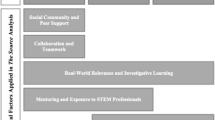Abstract
Margaret Beier, Leslie Miller, and Shu Wang’s paper, Science games and the development of possible selves examines the effects of game-playing in a serious scientific game on science possible selves identity creation, utilizing a possible selves identification instrument they created. This paper continues the discussion that Beier and colleagues start in the paper by calling into question both the idea that a predictive model of science career choice can be attained by serious science game-playing and the nature of the instrument created and used by Beier and her colleagues to identify participants’ creation of science possible selves. Recommendations include incorporating the idea of possible selves as being complex, dynamic and intertwined with self-concept in interpreting their findings and casting a wider net to capture the phenomena of their participants’ identities and experiences by potentially making use of possible selves identification methodologies from the career training arena.
Similar content being viewed by others
References
Beier, M. E., Miller, L. M., & Wang, S. (2012). Science games and the development of scientific possible selves. Cultural Studies of Science Education,. doi:10.1111/j.1754-9434.2012.01420.x.
Bruner, J. (1990). Acts of meaning. Cambridge: Harvard University Press.
Chambers, D. W. (1983). Stereotypic images of the scientist: The draw-a-scientist test. Science Education, 67, 255–265. doi:10.1002/sce.3730670213.
Cross, S. E., & Markus, H. (1994). Self-schemas, possible selves, and competent performance. Journal of Educational Psychology, 86, 423–438. doi:10.1037//0022-0663.86.3.423.
Dodge, T., Barab, S., Stuckey, B., Warren, S., Heiselt, C., & Stein, R. (2008). Children’s sense of self: Learning and meaning in the digital age. Journal of Interactive Learning Research, 19, 225–249.
Dweck, C. S. (2006). Mindset. New York: Random House.
Erikson, E. H. (1968). Identity: Youth and crisis. New York: Norton.
Finson, K. D. (2002). Drawing a scientist: What we do and do not know after fifty years of drawings. School Science and Mathematics, 102, 335–345. doi:10.1111/j.1949-8594.1995.tb15762.x.
Hock, M., Schumaker, J., & Deshler, D. (2003). Possible selves: Nurturing student motivation. Lawrence: Edge Enterprises.
Hoskins, M., & Leseho, J. (1996). Changing metaphors of the self: Implications for counseling. Journal of Counseling & Development, 74, 243–252. doi:10.1002/j.1556-6676.1996.tb01860.x.
Kelly, G. (1955). Principles of personal construct psychology. New York: Norton.
Lee, J. J., & Hoadley, C. M. (2007). Leveraging identity to make learning fun: Possible selves and experiential learning in massively multiplayer online games (MMOGs). Innovate, 6. doi:10.1109/ICALT.2006.1652553.
Markus, H., & Nurius, P. (1986). Possible selves. American Psychologist, 41, 954–969. doi:10.1037//0003-066X.41.9.954.
Markus, H., & Wurf, E. (1987). The dynamic self-concept: A social psychological perspective. In M. R. Rosenweig, & L. W. Porter (Eds.), Annual review of psychology, Vol. 38 (pp. 299–337). doi:10.1146/annurev.psych.38.1.299.
Norman, C., & Aron, A. (2003). Aspects of future self that predict motivation to achieve or avoid it. Journal of Experimental Social Psychology, 39, 500–507.
Oyserman, D. (2008). Possible selves: Identity-based motivation and school success. In H. Marsh, R. Craven, & D. McInerney (Eds.), Self-processes, learning and enabling human potential dynamic new approaches, Vol 3rd International Advances in Self Research (pp. 269–288). USA: Information Age Press.
Oyserman, D., Bybee, D., & Terry, K. (2006). Possible selves and academic outcomes: How and when possible selves impel action. Journal of Personality and Social Psychology, 91, 188–204. doi:10.1037/0022-3514.91.1.188.
Oyserman, D., & Markus, H. R. (1990). Possible selves and delinquency. Journal of Personality and Social Psychology, 59, 112–125.
Packard, B. W., & Nguyen, D. (2003). Science career-related possible selves of adolescent girls: A longitudinal study. Journal of Career Development, 29, 4. doi:10.1177/089484530302900403.
Ruvolo, A. P., & Markus, H. R. (1992). Possible selves and performance: The power of self-relevant imagery. Social Cognition, 10, 95–124. doi:10.1521/soco.1992.10.1.95.
Schunk, D. H., & Zimmerman, B. J. (1997). Social origins of self-regulatory competence. Educational Psychologist, 32, 195–208. doi:10.1207/s15326985ep3204_1.
Shepard, B., & Marshall, A. (1999). Possible selves mapping: Life-career exploration with young adolescents. Canadian Journal of Counselling, 33, 37–54.
Smith, J. (2006). The self-regulated nature of self-concept and the life world: Investigating the process of personal change and transition. Educate, 4(2), 45–65. Retrieved August 02, 2012 from http://www.educatejournal.org/index.php/educate/article/view/38.
Steele, C. M., & Aronson, J. (1995). Stereotype threat and the intellectual test performance of African Americans. Journal of Personality and Social Psychology, 69, 797–811. doi:10.1037/0022-3514.69.5.797.
Sternberg, R. J. (1997). Metaphors of mind conceptions of the nature of intelligence. Cambridge: Cambridge University Press.
Author information
Authors and Affiliations
Corresponding author
Additional information
Lead Editor: C. Milne.
Forum response to Beier, Miller, and Wang (2012). Science games and the development of scientific possible selves. doi:10.1007/s11422-012-9408-0
Rights and permissions
About this article
Cite this article
Khan, M.S. Serious science games, social selves and complex nature of possible selves . Cult Stud of Sci Educ 7, 993–1000 (2012). https://doi.org/10.1007/s11422-012-9467-2
Received:
Accepted:
Published:
Issue Date:
DOI: https://doi.org/10.1007/s11422-012-9467-2




